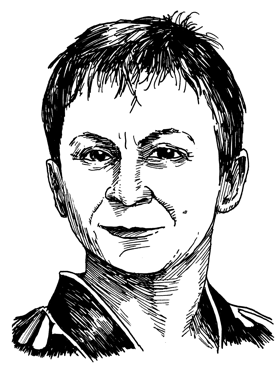
An excerpt from the Believer interview with Anne Enright, which appears in this month’s issue.
III. THICK ANKLES
BLVR: Have you become more aware of your Irishness as you have traveled the world?
AE: One of the things you want with travel is to get away from yourself, and one of the things about traveling as a writer is that you are obliged to talk about yourself all the time. So you are in some amazing or lovely or interesting place and you’re talking the same talk about yourself and about Irishness, until you want to throw up. Sometimes being Irish feels like a job you never applied for. I don’t mind being Irish, but I am not a big fan of nationalism.
BLVR: How do you recharge, get the creative juices flowing, after a spell of traveling to promote a book?
AE: You have to try to stay healthy. The road is tough. I do an Ashtanga class when I am home. It’s a very hard kind of yoga and I am really crap at it and everyone in the room is very lithe and I’m not, but I feel all that is good for me, that it is important to be bad at yoga. It’s a flow practice, and the sequence of poses is always the same, and it is synchronized with the breath. Anyway, as we know, in yoga there is no progress. There is no proficiency.
BLVR: Does it help you write?
AE: You learn a lot of the same lessons at the desk that you learn on the yoga mat. You learn to observe your emotions about your work rather than indulge them. When you find yourself saying, “This is terrible,” “This is brilliant,” “This is sad,” you learn to just watch those emotions rather than believe them. And there is a monastic quality about working at the desk every day for many years that yoga seems to make sense of.
BLVR: But why do the yoga if there is no progress?
AE: The underlying assumption of that question is appalling: that you must progress in order to do anything.
BLVR: Is your yoga a spiritual practice?
AE: I don’t quite know what “spiritual” means in this context. Or any context. Is it something like looking at a sunset? Spirituality is a spookily private part of people’s makeup, really. Ashtanga is a very physical practice. It’s all about the breath. The asanas are very simple things that you just repeat, really.
No, I don’t get very transcendental about yoga, I have to say. At the beginning, some years ago, I used to see amazing things inSavasana [corpse pose, lying-down meditation],...
You have reached your article limit
Sign up for a digital subscription and continue reading all new issues, plus our entire archives, for just $1.50/month.
Already a subscriber? Sign in




